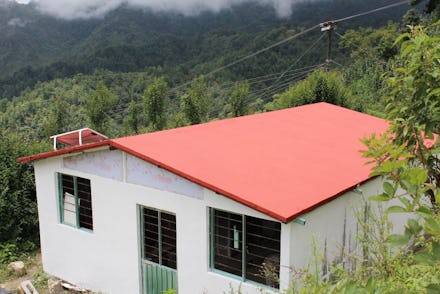This Startup Is Turning Plastic Waste Into Affordable Housing to Fight Poverty

One man is recycling Mexico's plastic and turning it into affordable houses.
Mexico's struggle with collecting and disposing of trash has long been documented. It's not just city streets that are littered with trash — picturesque beachfronts gleam with debris as well. A variety of initiatives have been born out of Mexico's garbage problem, including a way to make fuel from waste, but the problem still persists. Now, someone has found a way to turn Mexico's public health problem into a source of housing for the country's poorest residents.
The company called Eco Domum, or Eco Home, is based in Puebla, Mexico. Founder Carlos Daniel González collects, sorts and melts down non-toxic plastics into a liquid, according to Unreasonable. That sludge is then put into a hydraulic press, which forms the plastic into hardened panels. It takes two tons of plastic to make one house. At scale, González's plastic houses could put a sizable dent in Mexico's plastic trash.
Houses range in size from 430 square feet to 460 square feet and contain a living room, two bedrooms, a kitchen and a bathroom. Each one requires about 80 panels and takes seven days to build. On average, the plant produces a house and a half's worth of panels a day. That may seem low, but compared with the usual time frame for public housing projects, it's extremely fast. By comparison, a home from Habitat for Humanity takes anywhere from eight months to two years to complete once an applicant has been approved.
Eco Domum's houses are also very affordable. A roof costs 600 pesos, while an exterior wall costs 650 pesos. Interior panels go for 500 pesos each. In total, a family could have one of Eco Domum's houses for 5,000 pesos or $273. For a family living below the poverty line on wages of about 2,329 pesos per month, Domum's houses are within reach.
So far, Eco Domum has made 500 135-square foot rooms from the panels for the city of Huauchinango and is slated to produce roughly 300 homes in 2016 for Pahuatlán and Chiconcuautla. The company hopes to expand its plastic houses to regions outside of Mexico in the next three to five years.